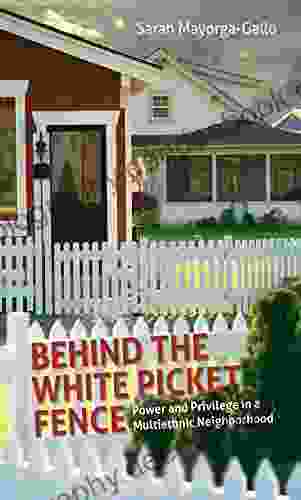Power and Privilege: The Interplay of Race, Class, and Gender in Multiethnic Neighborhoods

Multiethnic neighborhoods are becoming increasingly common in cities around the world, as people from diverse backgrounds seek to live and work in close proximity. While these neighborhoods can be vibrant and inclusive, they can also be sites of inequality and conflict. Power and privilege play a significant role in shaping the experiences of residents in multiethnic neighborhoods, and understanding the ways in which these factors intersect is essential for creating more equitable and just communities.
Power
Power is the ability to control or influence the behavior of others. It can be exercised through a variety of means, including physical force, economic resources, or social status. In multiethnic neighborhoods, power is often distributed unevenly along lines of race, class, and gender.
4.8 out of 5
| Language | : | English |
| File size | : | 2076 KB |
| Text-to-Speech | : | Enabled |
| Screen Reader | : | Supported |
| Enhanced typesetting | : | Enabled |
| Print length | : | 200 pages |
Race
Race is a social construct that has been used to justify discrimination and oppression for centuries. In multiethnic neighborhoods, people of color are often subject to discrimination and violence, and they may have less access to resources and opportunities than white residents. This can lead to a sense of powerlessness and alienation, and it can make it difficult for people of color to participate fully in the life of their community.
Class
Class is another important factor that shapes power in multiethnic neighborhoods. Wealthy residents often have more access to resources and opportunities than poor residents, and they may be more likely to be heard by decision-makers. This can lead to a situation in which the needs of the poor are ignored, and they are unable to participate fully in the life of their community.
Gender
Gender also plays a role in shaping power in multiethnic neighborhoods. Women are often subject to discrimination and violence, and they may have less access to resources and opportunities than men. This can lead to a sense of powerlessness and vulnerability, and it can make it difficult for women to participate fully in the life of their community.
The Interplay of Power and Privilege
Power and privilege are often intertwined, and they can reinforce each other. For example, white, male, wealthy residents often have the most power in multiethnic neighborhoods, while people of color, women, and poor residents often have the least power. This can lead to a situation in which the needs of the most marginalized residents are ignored, and they are unable to participate fully in the life of their community.
The Effects of Power and Privilege on Multiethnic Neighborhoods
Power and privilege can have a negative impact on multiethnic neighborhoods. When power is concentrated in the hands of a few, it can lead to inequality, conflict, and distrust. This can make it difficult to build community and create a sense of belonging for all residents.
Strategies for Creating More Equitable and Just Multiethnic Neighborhoods
There are a number of strategies that can be used to create more equitable and just multiethnic neighborhoods. These include:
- Increasing the political participation of marginalized residents. When marginalized residents have a voice in decision-making, they are more likely to see their needs met. This can be done through a variety of means, such as encouraging voter registration, supporting community organizing, and providing training on how to participate in local government.
- Investing in affordable housing and other programs that benefit low-income residents. When low-income residents have access to affordable housing, healthcare, and other essential services, they are more likely to be able to participate fully in the life of their community. This can help to reduce inequality and create a more just and equitable society.
- Challenging racism and other forms of discrimination. Racism and other forms of discrimination are major barriers to creating more equitable and just multiethnic neighborhoods. It is important to challenge these attitudes and behaviors, and to work to create a more inclusive society.
Power and privilege are significant factors that shape the experiences of residents in multiethnic neighborhoods. By understanding the ways in which these factors intersect, we can work to create more equitable and just communities. This will benefit everyone, regardless of their race, class, or gender.
Long Descriptive Keywords for Alt Attribute
- A group of people of different races and ethnicities walking and talking in a park.
- A group of people of different socioeconomic backgrounds sitting at a table in a community center.
- A group of women of different races and ages standing in a circle, talking and laughing.
- A group of children of different races and ethnicities playing together in a playground.
- A group of people of different races and ethnicities working together in a community garden.
Long Tail SEO Title
- The Interplay of Power and Privilege in Multiethnic Neighborhoods: A Comprehensive Analysis of Race, Class, and Gender Dynamics
4.8 out of 5
| Language | : | English |
| File size | : | 2076 KB |
| Text-to-Speech | : | Enabled |
| Screen Reader | : | Supported |
| Enhanced typesetting | : | Enabled |
| Print length | : | 200 pages |
Do you want to contribute by writing guest posts on this blog?
Please contact us and send us a resume of previous articles that you have written.
 Novel
Novel Genre
Genre Reader
Reader Library
Library Paperback
Paperback Newspaper
Newspaper Paragraph
Paragraph Bookmark
Bookmark Shelf
Shelf Bibliography
Bibliography Preface
Preface Synopsis
Synopsis Annotation
Annotation Manuscript
Manuscript Scroll
Scroll Classics
Classics Narrative
Narrative Biography
Biography Autobiography
Autobiography Reference
Reference Encyclopedia
Encyclopedia Thesaurus
Thesaurus Character
Character Catalog
Catalog Borrowing
Borrowing Archives
Archives Research
Research Scholarly
Scholarly Lending
Lending Reserve
Reserve Reading Room
Reading Room Rare Books
Rare Books Special Collections
Special Collections Interlibrary
Interlibrary Literacy
Literacy Thesis
Thesis Dissertation
Dissertation Awards
Awards Book Club
Book Club Theory
Theory Irina Rish
Irina Rish Gigi Priebe
Gigi Priebe Natalie Shaw
Natalie Shaw James F Fisher
James F Fisher Yasmina Bestaoui Sebbane
Yasmina Bestaoui Sebbane John Eade
John Eade Benjamin Fisher
Benjamin Fisher Lisa Childs
Lisa Childs Angela Watson
Angela Watson Thomas Doherty
Thomas Doherty David White
David White Greg Thain
Greg Thain C Hallman
C Hallman Aaron Chandler
Aaron Chandler Tommy Wasserman
Tommy Wasserman Elizabeth Hardinger
Elizabeth Hardinger Peter Oborne
Peter Oborne Savour Press
Savour Press Michael M Carter
Michael M Carter George Swimmer
George Swimmer
Light bulbAdvertise smarter! Our strategic ad space ensures maximum exposure. Reserve your spot today!

 Chuck MitchellEmbark on an Arctic Adventure: Discover the Enchanting Arctic Circle and...
Chuck MitchellEmbark on an Arctic Adventure: Discover the Enchanting Arctic Circle and... James HayesFollow ·17.6k
James HayesFollow ·17.6k Robert Louis StevensonFollow ·11.6k
Robert Louis StevensonFollow ·11.6k Henry David ThoreauFollow ·5.1k
Henry David ThoreauFollow ·5.1k Jeffrey CoxFollow ·16.4k
Jeffrey CoxFollow ·16.4k Francis TurnerFollow ·5.3k
Francis TurnerFollow ·5.3k Mark MitchellFollow ·15.2k
Mark MitchellFollow ·15.2k Eugene PowellFollow ·18.7k
Eugene PowellFollow ·18.7k Christian BarnesFollow ·8.9k
Christian BarnesFollow ·8.9k

 Franklin Bell
Franklin BellSecond Edition Pdf No Audio: A Comprehensive Guide to the...
The Second Edition...

 Jackson Blair
Jackson BlairTrends and Issues in Instructional Design and Technology
Instructional...

 Mario Vargas Llosa
Mario Vargas LlosaEnchanting Enigma Variations and Triumphant Pomp and...
The Enigma Variations: A...

 Dwight Blair
Dwight BlairTime Between Us: A Novel That Explores the Power of...
Prepare to be swept away by...
4.8 out of 5
| Language | : | English |
| File size | : | 2076 KB |
| Text-to-Speech | : | Enabled |
| Screen Reader | : | Supported |
| Enhanced typesetting | : | Enabled |
| Print length | : | 200 pages |














